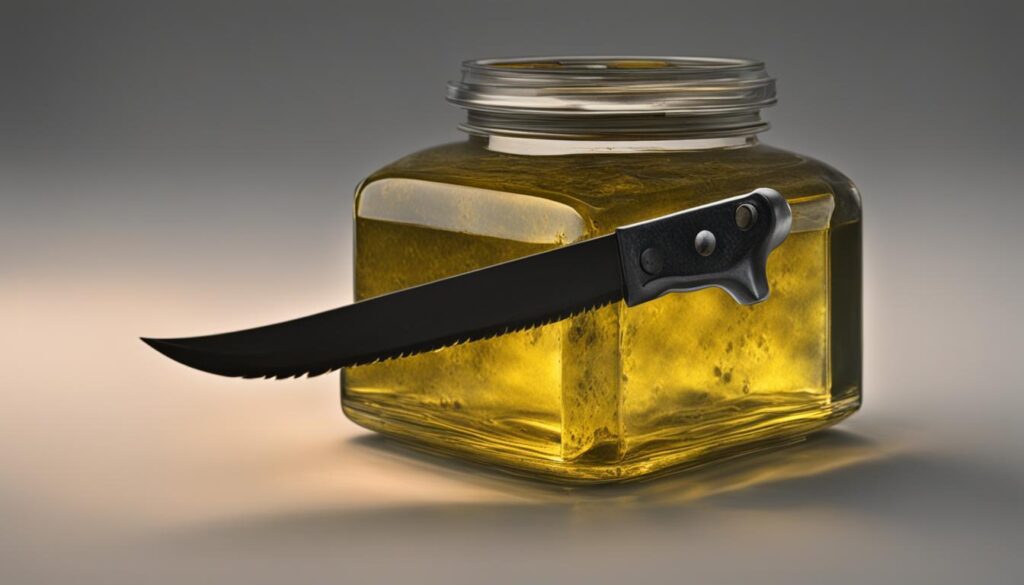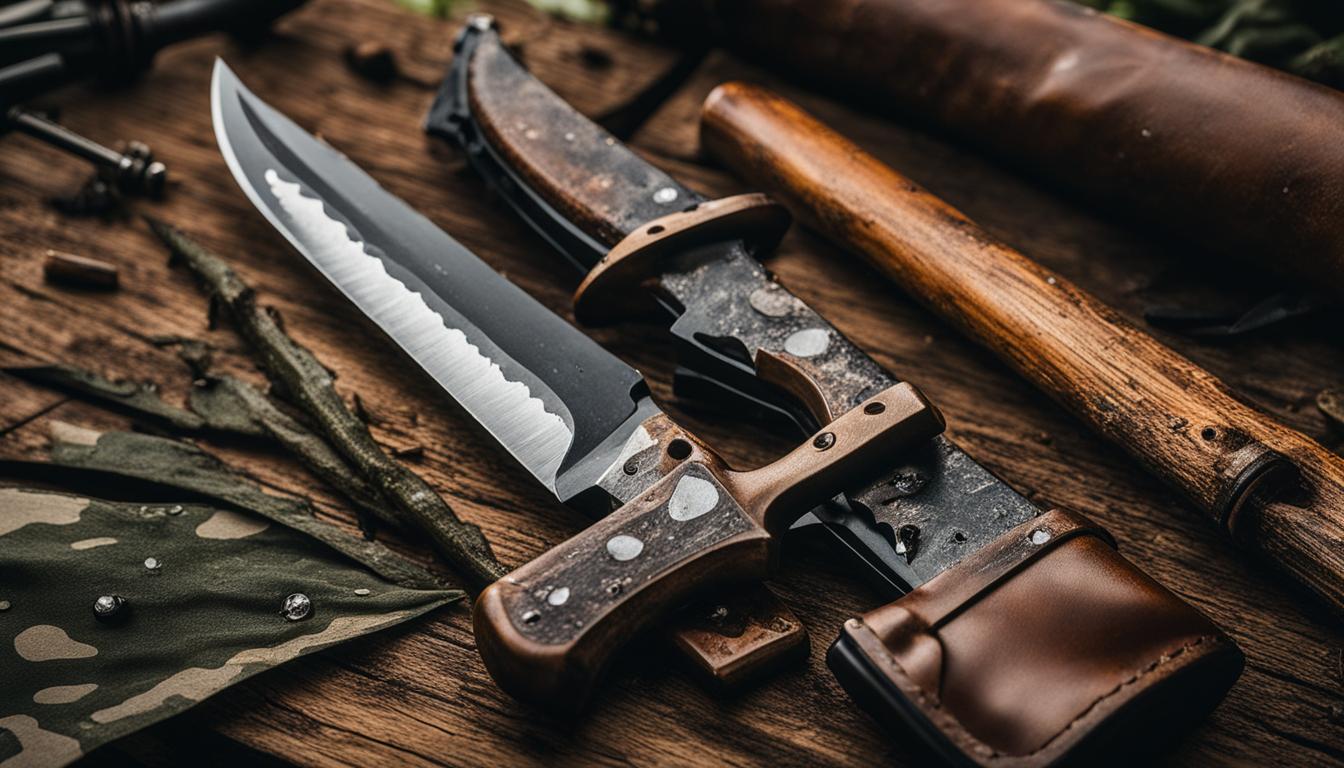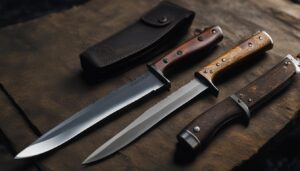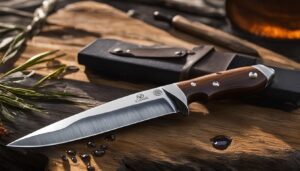Rust can damage the blade of a hunting knife and impact its performance. To keep your hunting knife rust-free, it’s important to take preventive measures. In this guide, I will share easy tips and techniques to protect your hunting knife from rust and ensure its longevity.
Key Takeaways:
- Regularly clean and dry your hunting knife to prevent rust formation.
- Store your knife in a dry area with low humidity to avoid exposure to moisture.
- Apply a protective coating, such as mineral oil, to the blade twice a year.
- Maintain and sharpen the blade regularly to prevent rust and ensure optimal performance.
- Choose a hunting knife with the right blade material and handle material to enhance its durability and corrosion resistance.
What Causes Rust on Hunting Knives?
Rust is a common problem that can affect the performance and longevity of hunting knives. Understanding the factors that contribute to rust formation is essential for effective prevention. When metal, such as steel, comes into contact with moisture and oxygen, a chemical reaction occurs, resulting in rust. Hunting knives are particularly susceptible to rust due to exposure to humid or wet environments.
Several factors can lead to rust on hunting knives. These include:
- Moisture: High levels of moisture, such as rain or humidity, can accelerate rust formation. When moisture comes into contact with the metal blade, it provides the necessary conditions for rust to develop.
- Oxygen: The presence of oxygen in the air is another critical factor in rust formation. When metal is exposed to oxygen, it undergoes oxidation, leading to the formation of rust.
- Acidic Substances: Acids, such as those found in food or cleaning products, can corrode the metal surface of a hunting knife, making it more prone to rust.
To prevent rust on hunting knives, it’s important to minimize exposure to these factors. Proper storage, regular cleaning, and maintenance will help protect your knife from rust and ensure its longevity.
Table: Factors Leading to Rust on Hunting Knives
| Factors | Effects |
|---|---|
| Moisture | Provides the necessary conditions for rust formation when it comes into contact with the metal blade. |
| Oxygen | Results in oxidation of the metal, leading to the formation of rust. |
| Acidic Substances | Corrodes the metal surface, making it more susceptible to rust. |
Cleaning Rust Off Hunting Knives
If your hunting knife has developed rust spots, it’s important to remove them promptly to prevent further damage. Fortunately, there are several effective methods for cleaning rust off hunting knives. One popular method is using vinegar, a common household ingredient known for its rust-removing properties. To use this method, submerge the blade of the knife in white vinegar for about 30 minutes, ensuring that the rusted areas are fully immerse. Then, using a soft sponge or cloth, gently scrub the blade to remove the rust. Rinse the knife with water and dry it thoroughly to prevent any moisture from causing new rust spots.
Another method for removing rust from a hunting knife is by using baking soda. Create a paste by mixing baking soda with water until it forms a thick consistency. Apply the paste to the rusted areas of the blade and let it sit for a few hours. Then, scrub the blade with a soft sponge or cloth to remove the rust. Rinse the knife with water and ensure it is completely dry before storing it.
For those looking for a natural alternative, lemon can also be used to remove rust from a hunting knife. Cut a lemon in half and squeeze out the juice onto the rusted areas of the blade. Let the lemon juice sit on the rust for about 10 minutes, then scrub the blade with a soft sponge or cloth. Rinse the knife with water and dry it thoroughly to prevent any new rust formation.
A surprising method to remove rust from a hunting knife is by using a potato. Cut a raw potato in half and sprinkle salt on the exposed fleshy side. Rub the potato onto the rusted areas of the blade, applying gentle pressure. The oxalic acid and natural abrasiveness of the potato and salt combination can effectively remove the rust. Rinse the knife with water and ensure it is completely dry before storing.
Table: Comparison of Rust Removal Methods
| Method | Ingredients | Effectiveness | Application Time |
|---|---|---|---|
| Vinegar | White vinegar | High | 30 minutes |
| Baking Soda | Baking soda, water | Medium | A few hours |
| Lemon | Lemon juice | Low | 10 minutes |
| Potato | Raw potato, salt | Medium | N/A |
Preventing Rust on Hunting Knives
Preventing rust on your hunting knife is essential for maintaining its performance and prolonging its lifespan. By implementing some simple preventive measures, you can protect your knife from rust and ensure it remains in optimal condition. Here are some effective tips:
Keep Your Knife Clean and Dry
After each use, make sure to clean your hunting knife thoroughly with a mild soap and water solution. Pay special attention to removing any dirt, debris, or moisture from the blade and handle. Once clean, ensure that the knife is completely dry before storing it.
Storing the knife in a dry area with low humidity is crucial for preventing rust. Avoid leaving the knife in a sheath or leather case for extended periods, as these can trap moisture and contribute to rust formation. Instead, store the knife in a well-ventilated area or use a moisture-absorbing product like silica gel packets to keep the storage environment dry.
Apply a Protective Coating
Applying a protective coating to your hunting knife can provide an additional layer of defense against rust. Mineral oil is a popular choice for protecting knife blades from moisture and corrosion. Simply apply a few drops of mineral oil to a clean cloth and rub it onto the blade, ensuring even coverage. Repeat this process every six months or as needed to maintain the protective coating.
Inspect and Maintain Regularly
Regular inspection and maintenance of your hunting knife are essential for preventing rust. Routinely check the blade for any signs of rust or corrosion, and address them promptly. Additionally, keep the knife sharp by regularly honing the blade and lubricating any moving parts to reduce friction and prevent rust formation.
By following these preventive measures, you can protect your hunting knife from rust and enjoy its reliable performance for years to come.

Proper Knife Maintenance and Care
To ensure the longevity of your hunting knife and prevent rust formation, proper maintenance and care are essential. By following these knife care tips, you can keep your hunting knife in top shape and ready for your next adventure.
Regular Cleaning
After each use, it’s important to clean your hunting knife thoroughly. Use a mild dish soap and warm water to gently clean the blade and handle. Avoid using harsh chemicals or abrasive materials as they can damage the knife’s finish. Rinse the knife under running water and pat it dry with a clean cloth. Pay special attention to any crevices or joints where dirt and moisture can accumulate.
Drying and Storing
Proper drying and storage are crucial to prevent rust on your hunting knife. After cleaning, make sure to dry the knife thoroughly, including any hidden areas such as the inside of the handle. Use a soft cloth to remove any moisture. Store your knife in a cool, dry place away from humidity and moisture. Consider using a knife pouch or sheath to protect the blade from exposure to air and potential damage.
Inspecting and Sharpening
Regularly inspect your hunting knife for any signs of wear, damage, or rust spots. If you notice any issues, address them promptly to prevent further damage. It’s also important to keep your knife sharp for optimal performance. Use a sharpening stone or honing rod to maintain the blade’s edge. Follow the manufacturer’s instructions or seek guidance from a professional if you’re unsure how to sharpen your knife properly.
Lubricating Moving Parts
If your hunting knife has moving parts such as a folding mechanism, it’s important to keep them lubricated. Apply a small amount of oil or lubricant to the joints and moving parts to ensure smooth operation. This will also help prevent rust by creating a protective barrier against moisture and oxidation. Be sure to use a lubricant that is safe for use on your specific knife.
| Knife Care Tips |
|---|
| Clean your hunting knife thoroughly after each use. |
| Dry the knife completely, including hidden areas. |
| Inspect the knife regularly for wear, damage, or rust spots. |
| Sharpen the blade using a sharpening stone or honing rod. |
| Lubricate moving parts with an appropriate oil or lubricant. |
By following these knife maintenance and care tips, you can ensure the longevity and performance of your hunting knife. Remember to clean, dry, and store your knife properly, and address any issues promptly. With proper maintenance, your hunting knife will be a reliable tool for many hunting seasons to come.


Choosing the Right Hunting Knife
When it comes to selecting a hunting knife, there are several factors to consider that can greatly impact its performance and durability. By understanding these factors, you can make an informed decision and choose a knife that best suits your needs. Here are some key considerations when selecting a hunting knife:
- Blade Type: The type of blade you choose will depend on the specific tasks you’ll be using the knife for. Fixed blades are generally more durable and reliable for heavy-duty tasks, while folding blades offer convenience and portability.
- Blade Material: Different blade materials have varying levels of corrosion resistance and edge retention. Stainless steel blades are known for their rust resistance, while high-carbon steel blades offer excellent edge retention but require more maintenance to prevent rust.
- Handle Material: The handle material affects the knife’s grip, comfort, and durability. Common handle materials include synthetic materials like G10 or Micarta, as well as natural materials like wood or bone.
- Tang Type: The tang refers to the portion of the blade that extends into the handle. A full tang provides maximum strength and stability, making it ideal for heavy-duty tasks. Partial tangs are suitable for lighter tasks but may be less durable.
By carefully considering these factors, you can choose a hunting knife that meets your specific requirements and provides excellent performance in the field.
Image:
Additional Tips for Knife Maintenance
When it comes to maintaining your hunting knife, there are a few additional tips and practices that can help prolong its lifespan and keep it in optimal condition. Here are some key things to keep in mind:
- Avoid harsh chemicals or abrasive materials: When cleaning your knife, it’s important to use mild soap and water, or specific knife cleaning solutions. Harsh chemicals and abrasive materials can damage the blade and handle, compromising the knife’s integrity and increasing the risk of rust formation.
- Use a honing rod: Regularly using a honing rod can help maintain the sharpness of your hunting knife’s blade. Gently run the blade along the honing rod at a consistent angle, starting from the base of the blade and moving towards the tip. This will help keep the edge keen and ready for use.
- Avoid excessive force or dropping: It’s important to handle your hunting knife with care. Avoid using excessive force when cutting or chopping, as this can put unnecessary strain on the blade and handle. Additionally, refrain from dropping your knife, as the impact can cause damage to the blade and increase the likelihood of rust formation.
Expert Quote:
“Proper knife maintenance goes beyond regular cleaning and storage. Avoiding harsh chemicals, using a honing rod, and handling your knife with care are all essential practices to ensure your hunting knife stays in the best possible condition.” – Knife Expert
By following these additional maintenance tips, you can further protect your hunting knife from rust and maintain its longevity. Keep in mind that proper care and regular maintenance are key to preserving your knife’s performance and ensuring it remains a reliable tool for all your hunting needs.
| Additional Tips for Knife Maintenance | Benefits |
|---|---|
| Avoid harsh chemicals or abrasive materials | Preserves blade and handle integrity |
| Use a honing rod | Maintains blade sharpness |
| Avoid excessive force or dropping | Prevents blade damage and rust formation |
Conclusion
In conclusion, preventing rust on your hunting knife requires a combination of regular maintenance and implementing preventive measures. By following the tips and techniques outlined in this guide, you can protect your knife from rust and ensure its longevity.
First and foremost, it’s important to clean your hunting knife after each use. Removing any dirt, debris, or moisture will help prevent rust formation. Make sure to dry the knife thoroughly before storing it to eliminate any lingering moisture that could lead to rust.
Additionally, storing your hunting knife in a dry area with low humidity is crucial. Moisture in the air can accelerate rust formation, so keeping your knife in a dry environment will minimize the risk. Consider using a protective coating, such as mineral oil, to provide an extra layer of rust prevention. Apply the coating twice a year for optimal results.
Lastly, regular inspection and maintenance will contribute to your knife’s longevity. Sharpening the blade when needed, lubricating moving parts, and avoiding excessive force or dropping the knife are all essential for preventing rust and maintaining performance.
FAQ
What causes rust on hunting knives?
Rust on hunting knives is caused by exposure to acidic substances, such as water, which react with the metal and result in the formation of rust.
How do I clean rust off a hunting knife?
To clean rust off a hunting knife, you can use methods such as vinegar, baking soda, lemon, or a potato, following specific steps for each method.
What preventive measures can I take to avoid rust on my hunting knife?
To prevent rust on your hunting knife, you should keep it clean and dry, store it in a dry area with low humidity, and apply a protective coating like mineral oil twice a year.
How can I properly maintain and care for my hunting knife?
Proper maintenance and care for your hunting knife include cleaning it after use, drying it thoroughly, storing it properly, inspecting and sharpening the blade regularly, and lubricating moving parts.
What factors should I consider when choosing a hunting knife to prevent rust?
When selecting a hunting knife, consider the blade type, blade material, handle material, and tang type, as these factors contribute to the knife’s durability, corrosion resistance, and overall performance.
Are there any additional tips for maintaining my hunting knife?
Yes, additional tips for maintaining your hunting knife include avoiding harsh chemicals or abrasive materials, using a honing rod to maintain blade sharpness, and avoiding excessive force or dropping the knife, as this can damage the blade and increase the risk of rust formation.





